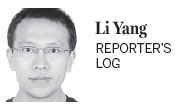The coverage of the annual sessions of China's top legislature and political advisory body offers a glimpse into the country's media landscape.
More than 2,000 Chinese journalists have been reporting on the sessions of the National People's Congress and Chinese People's Political Consultative Conference this year. The two sessions usually take place in the first two weeks of March.

The NPC is made up of about 2,000 deputies from all walks of life. Its duties include assessing the government's work over the past year and its targets for the coming 12 months. It must also examine the government's budget and revise old and new laws when necessary.
The CPPCC National Committee consists of experts, businesspeople, artists and retired senior officials. It is tasked with giving professional advice to promote good governance of the country.
The two sessions give journalists rich ore to mine as they offer so many opportunities to meet political highfliers and leading businessmen.
However, many people have expressed disappointment at the reports that have appeared in newspapers and on TV, radio and the Internet recently.
Web-based media now resemble wholesalers of news to their three precursors. Stories, photos and videos are almost always published online first and then adapted to the other media formats.
China now has over 600 million Internet users. Reporters know their tastes, how to attract the most clicks and who can spread the news the fastest.
Selecting the most eye-catching quotes from the celebrity attendees of the two sessions and packaging them into reader-friendly products are the top priority for many reporters, whose payment and performance are directly determined and evaluated by the popularity of the "news" they deliver.
But many important topics related to reform, transformation of the economy, laws and modernization of the government are being submerged by reports on less newsworthy issues.
Although most of the reporters have been trained to sniff out hot stories at school, they are redefining the concept of what is news according to how they perceive the market and their readership.
The results of the sessions are crucial to the public interest. The government's new budget, policies and laws concern not only the Chinese people but many other countries given China's emerging role in a globalized world.
It is a pity that few media provide in-depth reports and analyses from their interviews with the NPC deputies and CPPCC members, even though these subjects have the knowledge and experience to provide news of great interest.
However, many of the reports offer little beyond entertainment value. China's development has come to such a phase that the media should contribute to a constructive public sphere open for debates on key issues concerning the country's national interest and the public good.
But many Chinese media have not met the requirements of the times and the country.
This is partly because there is not a press law in the country, and so many Chinese journalists in their early 20s lack the skills or experience to make sound judgments of a story's newsworthiness.
The low pay, a result partially because of the immature media market, also tends to drive the more talented of the bunch to other professions after a few years.
Some of the younger reporters, especially those working in TV, even treat the two sessions as a platform to show off their good looks in a bid to achieve quick success.
Moreover, some NPC deputies and CPPCC members lack the expertise that their titles demand.
If reporters were clearer about the job they are supposed to do they would not be so easily led astray by this blind pursuit of clicks and viewership.
Rather, they would take the lead in setting the agenda in terms of keeping the public informed of the important news and developments at the two sessions.
They would provide a check on power and expose those unqualified conference attendees while monitoring the rest to ensure they also better serve the people.
Contact the writer at liyang@chinadaily.com.cn